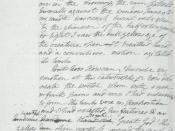Research Assignment: Cloning 1. What is cloning? Cloning is the technique of creating a copy of a cell or group of cells. There are three main ways to clone a cell; Splitting off a cell from an embryo, the Roslin technique (used for Dolly), and the Honalulu technique. Each way is very complicated and requires a vast amount of research and experimenting before completed. A bill has been passed to ensure that no cloning can be done. The bill also prevents the use of federal money for experimentation of human cells. For years now people have argued over the question "Is cloning acceptable?" and "Should cloning be done?" These questions have arisen many confrontations between the beliefs of religion and science.
2. What is the future of cloning? So far, no one knows what the outcome will be for cloning in the future. People can only hope and state their opinions based on their beliefs.
Religions state that cloning is unacceptable and morally wrong, while science experts state it can greatly benefit mankind. Both sides prove good points and should both be taken into consideration before making a final decision. Cloning offers a promising future in my opinion. Based on recent surveys, heart disease is the number killer in the United States. Therefore cloning can prove to benefit people greatly if scientists can research and find a way to clone heart cells. Cloning must have its limits; it must not be done to create life itself. Great responsibilities come with cloning, people must not abuse it. If proper restrictions are made, then I see a great future in the world of cloning.
3. Who supports it? Who is against it? Why? Many people have many views on cloning. So far there are only two categories of people: those who are with it, and those who are against it. People of Islamic background are generally against it, their religion forbids the act cloning. For others who are against it of religious background, cloning presents a moral question 'Are we Playing God?' Others who are against it believe cloning will show horrific results, possibly wiping out the entire human race. Cloning possesses the possibility of creating diseases and viruses in our cattle such as 'mad cow disease'; this would result in a great shortage of food. The people who are with cloning feel it could benefit all of humanity. Cloning might prove to help women and lower the number of miscarriages. It could also eliminate the waiting list for injured people who are in need for a transplant of vital organs such as a heart or liver. By continuing cloning research, scientist believe they my one day be able to control the division of cancer cells and therefore find a cure for cancer.
4. What can 'Frankenstein' teach us about cloning? The novel Frankenstein by Mary Shelley shows an author's perception of what may happen if the research of cloning goes too far. Mary Shelley suggests that creating life can hurt many people. The main person hurt being the creation itself. Frankenstein teaches us not to play around with things we don't quite understand. Things such as creating life aren't supposed to be tampered with and are best left alone. However, Mary Shelley was writing under the influence of her husband Percey (a romantic). This could mean he had an effect on what she wrote. Since romantics are against science and with nature, Mary and Percy could have written this novel in a form of rebellion in order to persuade others to think like they did and become a romantic. Therefore Frankenstein's message is only the opinion of romantics. Works Cited Pros, cons, and views about cloning : www. abc.lv/thinkquest/gallery/indexf.html (Not Dated) Three ways to clone mammals : www. humancloning.org/threeways.htm (Not Dated) Cloning, Cloning : www.humancloning.org/jill.htm (Not Dated) The Cloning Media Centre : www.abc.lv/thinkquest/gallery/indexf.html (Not Dated) Moral and Ethnic concerns of cloning: www.ri.bbsc.ac.uk/library/research/cloning (March 3 1998)





